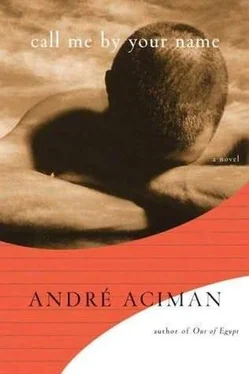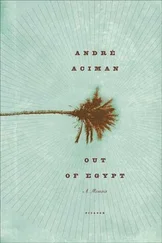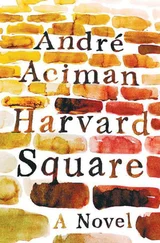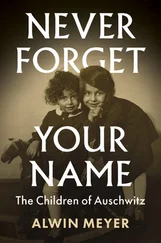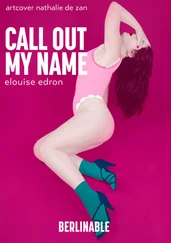André Aciman - Call Me by Your Name
Здесь есть возможность читать онлайн «André Aciman - Call Me by Your Name» весь текст электронной книги совершенно бесплатно (целиком полную версию без сокращений). В некоторых случаях можно слушать аудио, скачать через торрент в формате fb2 и присутствует краткое содержание. Год выпуска: 2007, Издательство: Farrar, Straus and Giroux, Жанр: Современная проза, на английском языке. Описание произведения, (предисловие) а так же отзывы посетителей доступны на портале библиотеки ЛибКат.
- Название:Call Me by Your Name
- Автор:
- Издательство:Farrar, Straus and Giroux
- Жанр:
- Год:2007
- ISBN:нет данных
- Рейтинг книги:5 / 5. Голосов: 6
-
Избранное:Добавить в избранное
- Отзывы:
-
Ваша оценка:
- 100
- 1
- 2
- 3
- 4
- 5
Call Me by Your Name: краткое содержание, описание и аннотация
Предлагаем к чтению аннотацию, описание, краткое содержание или предисловие (зависит от того, что написал сам автор книги «Call Me by Your Name»). Если вы не нашли необходимую информацию о книге — напишите в комментариях, мы постараемся отыскать её.
is clear-eyed, bare-knuckled, and ultimately unforgettable.
Call Me by Your Name — читать онлайн бесплатно полную книгу (весь текст) целиком
Ниже представлен текст книги, разбитый по страницам. Система сохранения места последней прочитанной страницы, позволяет с удобством читать онлайн бесплатно книгу «Call Me by Your Name», без необходимости каждый раз заново искать на чём Вы остановились. Поставьте закладку, и сможете в любой момент перейти на страницу, на которой закончили чтение.
Интервал:
Закладка:
Guido, vorrei che tu e Lapo ed io
fossimo presi per incantamento,
e messi ad un vascel, ch’ad ogni vento
per mare andasse a voler vostro e mio.
Guido, I would that Lapo, thou, and I
Led by some strong enchantment, might ascend
A magic ship, whose charmed sails should fly
With winds at will, where’er our thoughts might wend.
How very true, I thought. Oliver, I wish that you and I and all those we’ve held dear might live forever in one house…
Having muttered his sotto voce verses, he would slowly resume his glaring, misanthropic stance until another tourist tossed him a coin.
E io, quando ’l suo braccio a me distese,
ficcaï li occhi per lo cotto aspetto,
sì che ’l viso abbrusciato non difese
la conoscenza süa al mio ’ntelletto;
e chinando la mano a la sua faccia,
rispuosi: “Siete voi qui, ser Brunetto?”
Soon as he touched me, I could no more avert
Mine eyes, but on his visage scorched and sered
Fixed them, until beneath the mask of hurt
Did the remembered lineaments appear.
And to his face my hand inclining down,
I answered, “Ser Brunetto, are you here?”
Same scornful look. Same rictus. The crowd dispersed. No one seemed to recognize the passage from the Fifteenth Canto of the Inferno where Dante meets his former teacher, Brunetto Latini. Two Americans, who had finally managed to fish out a few coins from their knapsack, tossed Dante a hail of tiny coins. Same glowering, pissed-off stare:
Ma che ciarifrega, che ciarimporta,
se l’oste ar vino cia messo l’acqua:
e noi je dimo, e noi je famo,
“ciai messo l’acqua
e nun te pagamo.”
What do we care, why do we give a damn
If the innkeeper watered down our wine.
We’ll just tell him, and we’ll just say:
“You’ve added water, and we won’t pay.”
Oliver couldn’t understand why everyone had burst out laughing at the hapless tourists. Because he’s reciting a Roman drinking song, and, unless you know it, it’s not funny.
I told him I’d show him a shortcut to the bookstore. He didn’t mind the long way. Maybe we should take the long way, what’s the rush? he said. Mine was better. Oliver seemed on edge and insisted. “Is there something I should know?” I finally asked. I thought it was a tactful way of giving him a chance to voice whatever was bothering him. Something he was uncomfortable with? Something having to do with his publisher? Someone else? My presence, perhaps? I can take perfectly good care of myself if you prefer to go alone. It suddenly hit me what was bothering him. I’ll be the professor’s son tagging along.
“That’s not it at all, you goose.”
“Then what is it?”
As we walked he put an arm around my waist.
“I don’t want anything to change or to come between us tonight.”
“Who’s the goose?”
He took a long look at me.
We decided to proceed my way, crossing over from Piazza Montecitorio to the Corso. Then up via Belsiana. “This is around where it started,” I said.
“What?”
“It.”
“That’s why you wanted to come by here?”
“With you.”
I had already told him the story. A young man on a bicycle three years ago, probably a grocer’s helper or errand boy, riding down a narrow path with his apron on, staring me straight in the face, as I stared back, no smile, just a troubled look, till he passed me by. And then I did what I always hope others might do in such cases. I waited a few seconds, then turned around. He had done the exact same thing. I don’t come from a family where you speak to strangers. He clearly did. He whisked the bicycle around and pedaled until he caught up with me. A few insignificant words uttered to make light conversation. How easily it came to him. Questions, questions, questions — just to keep the words flowing — while I didn’t even have breath to utter “yes” or “no.” He shook my hand but clearly as an excuse to hold it. Then put his arm around me and pressed me to him, as if we were sharing a joke that had made us laugh and drawn us closer. Did I want to get together in a nearby movie house, perhaps? I shook my head. Did I want to follow him to the store — boss was most likely gone by this time in the evening. Shook my head again. Are you shy? I nodded. All this without letting go of my hand, squeezing my hand, squeezing my shoulder, rubbing the nape of my neck with a patronizing and forgiving smile, as if he’d already given up but wasn’t willing to call it quits just yet. Why not? he kept asking. I could have — easily — I didn’t.
“I turned down so many. Never went after anyone.”
“You went after me.”
“You let me.”
Via Frattina, via Borgognona, via Condotti, via delle Carrozze, della Croce, via Vittoria. Suddenly I loved them all. As we approached the bookstore, Oliver said I should go along, he’d just make a quick local phone call. He could have called from the hotel. Or perhaps he needed privacy. So I kept walking, stopping at a local bar to buy cigarettes. When I reached the bookstore with its large glass door and two clay Roman busts sitting on two seemingly antique stumps, I suddenly got nervous. The place was packed, and through the thick glass door, with spare bronze trimming around it, you could make out a throng of adults, all of them eating what appeared to be petits fours. Someone inside saw me peering into the store and signaled me to come in. I shook my head, indicating with a hesitant index finger that I was waiting for someone who was just coming up this road here. But the owner, or his assistant, like a club manager, without stepping down on the sidewalk, pushed the glass door wide open with his arm totally extended and held it there, almost ordering me to come in. “Venga, su, venga!” he said, the sleeves of his shirt rakishly rolled up to his shoulders. The reading had not started yet but the bookstore was filled to capacity, everyone smoking, chatting loudly, leafing through new books, each holding a tiny plastic cup with what looked like scotch whiskey. Even the upstairs gallery, whose banister was lined with the bare elbows and forearms of women, was tightly packed. I recognized the author right away. He was the same man who had signed both Marzia’s and my copy of his book of poems, Se l’amore. He was shaking several hands.
When he walked by me, I couldn’t help but extend my hand and shake his and tell him how much I had enjoyed reading his poems. How could I have read his poems, if the book wasn’t even out yet? Someone else overheard his question — were they going to throw me out of the store like an impostor?
“I purchased it in the bookstore in B. a few weeks ago, and you were kind enough to sign it for me.”
He remembered the evening, so he said. “ Un vero fan , a real fan, then,” he added loudly, so that the others within hearing distance might hear. In fact, they all turned around. “Maybe not a fan — at his age they’re more likely to be called groupies,” added an elderly woman with a goiter and loud colors that made her look like a toucan.
“Which poem did you like best?”
“Alfredo, you’re behaving like a teacher at an oral exam,” jibed a thirty-something woman.
“I just wanted to know which poem he liked best. There’s no harm in asking, is there?” he whined with quivering mock exasperation in his voice.
For a moment I believed that the woman who had stood up for me had gotten me off the hook. I was mistaken.
“So tell me,” he resumed, “which one.”
“The one comparing life to San Clemente.”
Читать дальшеИнтервал:
Закладка:
Похожие книги на «Call Me by Your Name»
Представляем Вашему вниманию похожие книги на «Call Me by Your Name» списком для выбора. Мы отобрали схожую по названию и смыслу литературу в надежде предоставить читателям больше вариантов отыскать новые, интересные, ещё непрочитанные произведения.
Обсуждение, отзывы о книге «Call Me by Your Name» и просто собственные мнения читателей. Оставьте ваши комментарии, напишите, что Вы думаете о произведении, его смысле или главных героях. Укажите что конкретно понравилось, а что нет, и почему Вы так считаете.
